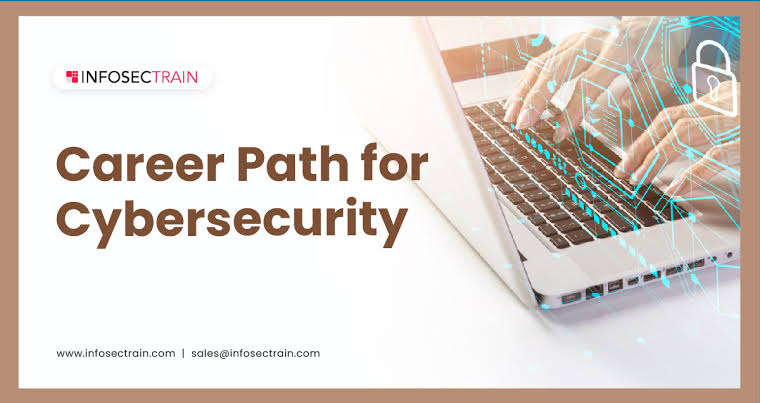Setting your foot strongly for a great career in Cybersecurity
Growing Demand: With the increasing reliance on technology and the digitalization of various industries, the demand for cybersecurity professionals is rapidly expanding.
2.Job Security: Cybersecurity professionals enjoy a high level of job security due to the continuous need for protection against cyber attacks.
3.Challenging and Dynamic Work: Cybersecurity is a field that presents constant challenges and ever-evolving threats.
4.Impact and Contribution: Working in cybersecurity allows you to make a significant impact by protecting organizations, individuals, and critical infrastructure from cyber threats.
5.Lucrative Salaries: The demand for cybersecurity professionals often exceeds the supply, leading to competitive salaries and attractive compensation packages.
6.Diverse Career Paths: Cybersecurity offers a wide range of career paths and specializations.
7.Continuous Learning and Professional Development: Cybersecurity is a field that demands constant learning and skill development.
Professional course in Cybersecurity
Course duration: 3 months
Course details:
Month 1 (Introduction)
Week 1: Introduction to Cybersecurity as a career- Overview of the course objectives and syllabus Understanding the importance of cybersecurity in today's digital landscape
- Introduction to common cybersecurity terminology and concepts
Weekly Hands-on practical session
- Identifying common online threats: malware, phishing etc.
- Understanding the motivations and goals of cyber attackers
- Analyzing real-world examples of cyber attacks
Weekly Hands-on practical session
- Introduction to social engineering techniques and tactics
- Understanding the psychological aspects of cybersecurity
- Social Engineering attack and social media
- Exploring strategies for user awareness and education
Weekly Hands-on practical session
- Secure online communication: Using encryption and secure messaging apps.
- Safe social networking: Guidelines for using social media platforms safely.
- Online gaming security: Protecting personal information while gaming online.
- Mobile device security: Securing smartphones and tablets against cyber threats.
- Incident reporting and seeking help: Knowing when and how to report cyber incidents and seeking assistance when needed.
Weekly Hands-on practical session
Monthly Bonus: Building of social engineering attack system
"A career in cybersecurity offers a chance to be on the front lines of the digital battle, protecting the world from cyber threats and making a difference in the lives of individuals and organizations"
-Anonymous
Month 2 (Information Security Techniques)
Week 1: Introduction to information security- Overview of the course objectives
- Importance of information security in today's digital world
- Basic terminology and concepts in information security
Weekly Hands-on practical session
- Introduction to information security principles and best practices
- Understanding the CIA triad: Confidentiality, Integrity, and Availability
- Exploring different layers of information security: physical, technical, and administrative
- Security goals and objectives
- Common security threats and vulnerabilities
Weekly Hands-on practical session
- Introduction to cryptographic concepts and algorithms
- Understanding encryption, decryption, and digital signatures
- Exploring common cryptographic protocols and their applications
Weekly Hands-on practical session
- Principles of access control
- Authentication methods and techniques
- Access control systems, surveillance, and monitoring
- Environmental controls and protection measures
- Authorization and access control models
Monthly Bonus: A course on programming and building of a programming project
Month 3 (Cybersecurity Career)

- Securing Phones, Computers and Tablets
- Creating strong and unique passwords: Importance of password security and best practices.
- Safe internet browsing: Recognizing and avoiding suspicious links, websites and files.
- System security and Hardening
Weekly Hands-on practical session
- Understand the role of security operations centers (SOC) in cybersecurity
- Introduce security incident and event management (SIEM) systems
- Learn about log analysis, threat hunting, and incident response in a SOC
- Discuss security monitoring best practices
- Case studies on effective security monitoring and incident response
Weekly Hands-on practical session on some SOC tools
- Understand the importance of data privacy and compliance in cybersecurity
- Discuss data protection laws and regulations, such as GDPR and CCPA
- Explore privacy-enhancing technologies and techniques
- Discuss compliance frameworks, such as ISO 27001 and NIST Cybersecurity Framework
- Real-world examples of data breaches and their impact on privacy
- Learn about threat intelligence and its role in cybersecurity
- Understand the different types of threat actors and their motivations
- Explore sources of threat intelligence and how to leverage them
- Introduce threat hunting techniques and tools
- Analyze real-world cyber threats and incidents
Weekly Hands-on practical session
- Introduction to the basics of cloud computing and its security challenges
- Introduction to Cloud service providers
- Understand the shared responsibility model in cloud security
-
Vulnerability Assessment/Pentesting
- Conducting vulnerability assessments using different tools
- Explore penetration testing methodologies and tools
- Reporting and remediation of vulnerabilities
Weekly Hands-on practical session
Bonus: Free Cybersecurity tools and resources
👉 Cost of programme: $150/N120k



